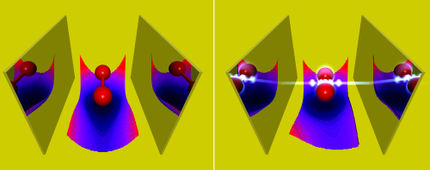Rapid procedure for the exploration of chemical compound space unites quantum chemistry with artificial intelligence
Advertisement
By combining quantum chemistry with artificial intelligence (Machine Learning), researchers at the Institute for Pure and Applied Mathematics at the University of California, Los Angeles achieved a scientific breakthrough expected to aid in exploring chemical compound space, i.e. the virtual space populated by all possible chemical compounds.
The interdisciplinary team from the Technische Universität Berlin (Germany), the Fritz-Haber Institute of the Max-Planck Society (Germany), and the Argonne Leadership Computing Facility (United States) dramatically increased the speed of calculating energies of small molecules with quantum chemical accuracy. Quantum chemical methods permit scientists to calculate molecular properties on a computer from first principles (i.e. without having to conduct any experiments) — they are necessary for many chemical applications such as catalysis, or the discovery of novel materials. Previously, such calculations demanded intensive computational resources.
Machine Learning, on the other hand, generates predictive models based on examples. While common in daily life, such as in Google's internet search engines or Amazon's book suggestions, it is also used in scientific domains, such as genetic research or brain computer interfaces. When applied to quantum chemistry, thousands of quantum chemical reference energies have been calculated in order to "learn" a molecular model. The resulting Machine permits the prediction of molecular properties with comparable accuracy within milliseconds, instead of hours. Such speed-up paves the way for highly accurate calculations of unprecedentedly many molecules.
Original publication
Other news from the department science

Get the chemical industry in your inbox
By submitting this form you agree that LUMITOS AG will send you the newsletter(s) selected above by email. Your data will not be passed on to third parties. Your data will be stored and processed in accordance with our data protection regulations. LUMITOS may contact you by email for the purpose of advertising or market and opinion surveys. You can revoke your consent at any time without giving reasons to LUMITOS AG, Ernst-Augustin-Str. 2, 12489 Berlin, Germany or by e-mail at revoke@lumitos.com with effect for the future. In addition, each email contains a link to unsubscribe from the corresponding newsletter.






























































